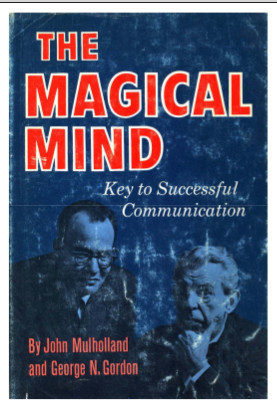“Truth would quickly cease to be stranger than fiction,
once we got as used to it.”
–H.L. Mencken.
Added: BIG LINK The Official CIA Manual of Deception (Mulholland et al.)
“Just as a magician’s methods must elude detection in front of a closely attentive audience, so an intelligence officer doing espionage work must elude close surveillance and pass messages and materiel without detection.”John McLaughlin Former Deputy Director, Central Intelligence

John Mulholland’s book:

Yes like Mulholland Drive…
It describes in better words what I’ve been trying to explain on my blog as the method used for 911. And states that this stage magician worked for the US CIA for a while…he quotes:
“The French conjurer of the 18th century, Robert Houdin, who magicians today call the Father of Modern Magic, once said, “It is immaterial how skillfully an orange is caused to disappear, my friend. There is no magic unless the audience is aware that the magician had an orange in the first place?”
This is directly analogous to cults and to politics.
Mulholland describes in better words what I’ve been trying to explain about 911 was done, re highly charged emotional wordings or events or imagery…which was the same method used by Hubbard in his books.
Now I have a cite describing this method, who did contract work for the CIA! More soon..
Excerpt (This is not the METHOD chapter, which is quite long, however this is directly related, and is the technique used by my enemies, and helped destroy Robert Minton)
What are the propagandist’s devices?
1. He tries to get his message to us at the exclusion of all others. This
device is his most effective weapon and makes his job difficult in
democratic countries—difficult, but not impossible if he is clever or
powerful enough. Spokesmen for big business silenced effectively the
voice of labor in the United States for many years. Conservative and
left-wing groups frequently find communications media closed to them.
The voice of the pacifist is often drowned out by hyperactive patriots. In
no way, however, does the propagandist in our culture have the clear
track he finds in Red China or the Soviet Union. But neither are
dissenting voices in America given the encouragement they receive
today in Great Britain and in some other democratic nations.
2. He appeals to our emotions rather than the rational side of our
natures. For the propagandist, feeling excludes thought. It is far easier
to excite us, annoy us, anger us, frighten us or flatter us than it is to
make us think. When we use our logical faculties, we are prone to doubt
our own conclusions. When we feel something, we trust our emotions.
Emotions may be aroused in seconds; our logical mechanisms work
more slowly. Therefore, much propaganda is designed to activate the
recipient’s emotions—to get him to react—either by modifying his
opinions and attitudes or by impelling him to do something— rather
than to think. The propagandist prefers to act on his victim in the most
direct and simple manner: by means of emotional appeals rather than
invitations to think clearly. Reaction without thought is one frequent
outcome of successful persuasion.
3. He gives little or no credence to views opposing his own. The
propagandist’s world is made up of unilateral views. He speaks in terms
of “rights” and “wrongs.” He presents only one side of an argument, and
if his opponent’s viewpoint is mentioned at all, it is immediately derided
and dismissed.
4. He says he is always working “for your benefit.” The propagandist
will usually deny motives of self-interest. He will lead you to understand
that your welfare is all he has at heart. He will cast himself as an altruist,
the bearer of facts who is out merely to “set the record straight.”
5. He will deny that he is a propagandist. In his lexicon he will have
hundreds of terms to cover the fact that his central task is that of
persuasion. He will be a bearer of “information,” his task may be “public
relations,” “publicity” or any number of weasel terms, but never, never
is he a propagandist.
6. He calls people who disagree with him “propagandists.” His
opponents are skillful, wily, clever and masters at the business of
propaganda. This device is even used by political campaigners. Do you
remember, back in 1956, when Harry Truman looked right into your
98living room from the TV tube to tell you that the Republicans were a
pack of liars you could trust as far as you could throw them, or words to
that effect? H.S.T. was a fine propagandist.
7. He will never back down in the face of opposing evidence. Evidence,
for the propagandist, is merely a diversion from the argument. “Don’t
bother me with facts,” he says in effect, “I have told you the truth. What
good are facts?” The correctness of his position, as he wants you to see
it, is above dispute.
8. He will use any device available to get his message across. If you
believe what you read in the newspapers, you will find the propagandist
masquerading as a journalist. If you are influenced by movies, he’ll
make one to your taste. If you read heavy books with scholarly formats,
he will print them. (This device works particularly well on professors.) If
you go to the theater, he’ll get to you by means of an actor from the
stage. He’ll speak from car cards in the subway or from skywriting air-
planes. He’ll print his message on shopping bags and cereal boxes. He
will be heard—somehow.
In the manner that he uses the various media of communications, the
propagandist is frequently an artist of no small accomplishment. Some
of the finest paintings in our tradition have been executed by painters
who were using their skills for persuasion. Certain propaganda films are
cinematic masterpieces. Because the propagandist’s convictions are
deep and his efforts usually untiring, the literature of persuasion is
invariably vigorous, sometimes inspiring. Even the art work in modern
advertising propaganda is original, technically expert and often
amusing. (From one point of view, it is a pity that so much creative
talent is wasted on what boils down to trivia. From another, we are
fortunate that advertising talent appears more effective in the world of
merchandising than in propagating social or political causes, despite
spurious propaganda we have heard about Madison Avenue’s influence
on politics.) These examples merely affirm Machiavelli’s
observation—made centuries ago—that persuasion is an art, and not an
easy one to master.
9. He will attempt any and all kinds of fallacious arguments possible if
he thinks he can get away with them. A book on elementary logic will
explain what the propagandist can do to the laws of logic. False
generalizations, poor analogies, linguistic tricks, appeals to authority,
special pleading, non sequiturs, appeals to tradition, faith, motherhood,
country and God are all grist for the propagandist’s mill. The fact that
his techniques have been discredited for hundreds of years means
nothing to him. If a spurious argument is likely to work, he will use it.
But equally important, he will avoid like the plague any kind of ar-
gument that is risky, may hurt his cause or may backfire. The skilled
99professional propagandist gives far more consideration to the kinds of
spurious logic he must avoid than those false arguments he does use.
Anyone can create good illogical arguments. The propagandist must
create perfect ones!
10. He is frightened of education. Since he can handle the tricks of his
propaganda adversary (or thinks he can), his main enemy is the
dispassionate, objective mind that would swing the spotlight of
scholarly scrutiny on his handiwork. He may quote academic studies
when they favor his cause. He may even hire certain amenable scholars
to do his documentation work for him, but the professors he buys do not
constitute a threat. They are not educators, because they are so busy
creating persuasion that they neatly label “research” that they have
neither time nor desire to be concerned with education. Propagandists
hate teachers, however, in the degree that teachers use the process of
education to free the minds of their students from the shackles of
persuasion.
11. He talks in terms of “good” and “bad,” rarely offering any
alternatives to either. For the propagandist, the shades of gray do not
exist. He offers things in black and white only. Either you are with him
or against him. Either he is right, or his opponent is. He manages to
polarize his arguments—that is, to turn things that are relative matters
into absolute “on the one hand” or “on the other hand” propositions.
You are caught, therefore, between the jaws of his “either-or” argument.
Grant that part of what he tells you is true, and he will tell you that you
have to believe the rest.
12. He talks in his victim’s language, using terms that are especially
meaningful to him. The propagandist exploits the values in life that his
victim thinks are important. He discovers the emotionally loaded
symbols of patriotism, home, family and religion that make his
persuasion seem immediately acceptable, because he talks to his
audience like one of the family. After carefully studying the things his
victim loves and hates in life and what he really considers important, the
propagandist is ready to speak to him “man to man” or “straight from
the shoulder.” This peculiar art in persuasion is both difficult and
powerful.
Are these methods occult or mysterious? Hardly.
They are effective. Evidence of their results is all around us.
Why do they work?
This is a very complicated matter, and often propagandists themselves
are not clearly aware of how great their power is or why their particular
type of persuasion works as well as it does. The psychology of
propaganda is not a simple matter, but it can be described in terms of
simple principles.
People respond to propaganda because the persuader has made
response easy for the recipient. The victim does not need to worry very
much about “ifs, ands and buts,” nor does he need to think strenuously
concerning the propagandist’s arguments. Everything is made simple
for him. “Do as I say,” implies the propagandist, “and you will be blessed
by one of the most fortunate of all human gifts: You will be relieved of
the obligation of having to think for yourself.”
——————————————————-
“Enlighten the people generally, and tyranny and oppressions of body and mind will vanish like evil spirits at the dawn of day.” (Thomas Jefferson, Letter to P. S. Dupont de Nemours, Poplar Forest. April 24, 1816.) ![]()

Image above from Edward Snowden documents - training presentation for an official governmental office describing actual online methods to control what YOU believe to be true.
truth does not pay well
Get notified when THE BOOK is finished, stay in balance, and allow yourself to feel good because you threw a little something in the tip jar. THE TIP JAR